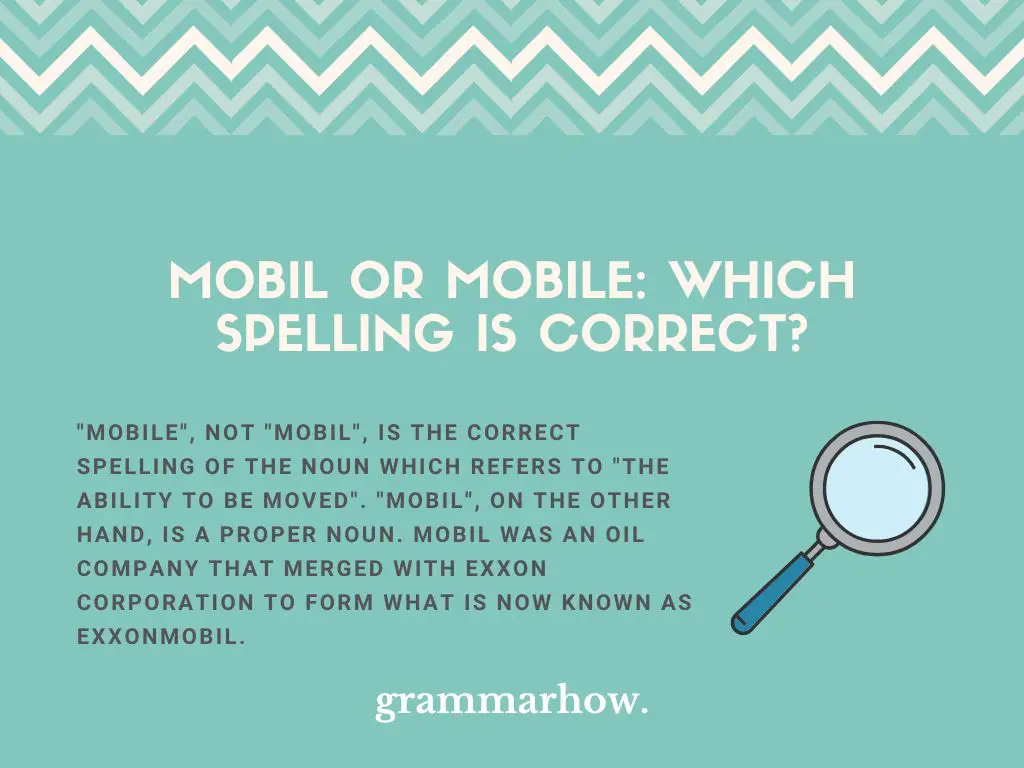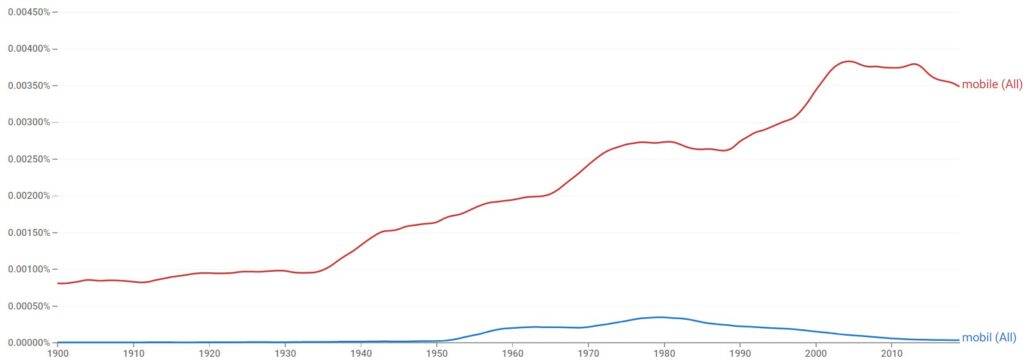It can be difficult to know when you’re spelling something correctly or using a completely different word altogether. In this article, we’ll be looking at the words “mobil” and “mobile”. Read on to find out which form of the word is correct!
Mobil or Mobile: Which Spelling Is Correct?
“Mobile”, not “mobil”, is the correct spelling of the noun which refers to “the ability to be moved”. “Mobil”, on the other hand, is a proper noun. Mobil was an oil company that merged with Exxon corporation to form what is now known as ExxonMobil.

When you are referring to the word that means “the ability to be moved”, the correct word to use is “mobile”, not “mobil”.
“Mobil” is only correct when it is used as a proper noun. The word “Mobil” refers to an American oil company that merged with Exxon corporation to form what is now known as ExxonMobil. Today, it is one of the world’s largest oil and gas companies. They still use the proper noun “Mobil” for its products.
The words “mobile” and “Mobil” both refer to completely different things. As such, these words are not synonymous and cannot be used interchangeably with one another.
Mobil
“Mobil” refers to ExxonMobil and some of its products.
Is “mobil” a word? The word “Mobil” is only correct when it is used as a proper noun. When spelled with a small ‘m’, it is incorrect.
Below are examples of the word “mobil” being used incorrectly:
- Incorrect: Have you got a mobil phone?
- Incorrect: I can’t believe I lost that girl’s mobil number.
- Incorrect: My son is very immobil.
Below are examples of how to correctly use “Mobil” in a sentence:
- My cousin got a job at ExxonMobil yesterday.
- Mobil Corporation merged with Exxon Corporation in 1999.
- I got a gift certificate for Mobil road trip kit for my birthday.
- Does your car use Mobil oil?
- My uncle used to work at Mobil back in the 80s.
Mobile
The word “mobile” means “the ability to be moved”.
The Cambridge Dictionary defines the word “mobile” as “the ability to be moved from one place to another”. It is also used in the United Kingdom as a synonym for the word “cell phone”.
The word can also be used to refer to a decorative work that hangs in the air, often used by babies and young children.
Below are examples of how to correctly use the word “mobile” in a sentence:
- My parents will kill me if I lose my new mobile!
- Those kinds of animals are often immobile.
- Catherine bought a glass mobile for her niece Tamara.
- Can I have your mobile number?
- He is often quite mobile at his job.
- The emergency medical unit isn’t particularly mobile, which is a shame.
- I tried calling you from my mobile phone, but nobody answered!
Which Is Used the Most?
According to data from Google Ngram Viewer, “mobile” is the form of the word that is more commonly used, rather than the word “Mobil”.
Google Ngram Viewer allows us to compare how often certain words (or certain forms of a word, in this case) are used in a wide range of books. Based on data from books written in English that were published between the years 1900 to 2019, we can conclude that “mobile” is more popular than the word “Mobil”.

This is to be expected, given that the correct use of the word “Mobil” is limited to the existence of the corporation. And even then, it is only used where the corporation is active.
“Mobile”, on the other hand, has many different definitions. The advent of mobile phones, in particular, has likely had an effect on the usage and subsequent popularity of the word.
Interestingly, there was an increase in the usage of the word “Mobil” from about 1950 to 2010, with its peak at around the 1980s. However, this pales in comparison to the popularity of the word “mobile”.
Final Thoughts
“Mobile” not “mobil”, is the correct word to use when referring to the noun that means “the ability to be moved”. “Mobil” is only correct when it is used as a proper noun. The word “mobil” when used with a small ‘m’ is incorrect.

Martin holds a Master’s degree in Finance and International Business. He has six years of experience in professional communication with clients, executives, and colleagues. Furthermore, he has teaching experience from Aarhus University. Martin has been featured as an expert in communication and teaching on Forbes and Shopify. Read more about Martin here.
